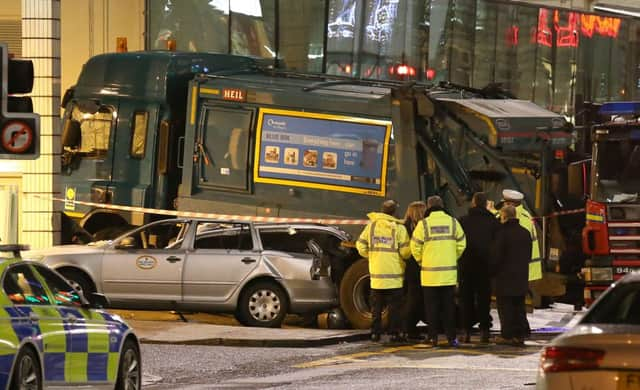Glasgow bin lorry crash: Driver’s GP ‘lacked due diligence’


Dr Ronald Neville, a GP who produces expert reports on drivers’ fitness to get behind the wheel, said doctors had missed an opportunity to review Mr Clarke’s fitness before he apparently blacked out at the wheel of the bin lorry that killed six people in George Square, Glasgow, on 22 December.
The fatal accident inquiry at Glasgow Sheriff Court heard suggestions that Mr Clarke “hoodwinked” GPs over his fitness to drive, but that a closer examination of his story could have provided an opportunity for him to be “rumbled”.
Advertisement
Hide AdAdvertisement
Hide AdThe inquiry has already heard that Mr Clarke had a previous blackout while driving a bus in 2010, but he provided conflicting accounts over the location of the incident.
Dr Kenneth Lyons, medical adviser to Mr Clarke’s former employer First Bus, provided the driver’s GP Dr John Langan with a letter stating the previous blackout happened at the wheel of a stationary bus.
But Mr Clarke later told Dr Langan it happened in a canteen while he was waiting for lunch.
Dr Neville said the distinction was important, as a blackout at the wheel of a bus should have been reported to the DVLA.
He said: “My view of Dr Langan’s report was that it lacked due diligence. It failed to pick up on an important issue, which is the discrepancy between where the event occurred.”
He said Dr Langan should also have provided Dr Lyons with a more detailed note of Mr Clarke’s medical history.
“All in all, I felt the letter from Dr Langan lacked a lot and had a crucial omission,” he said.
“There wasn’t the detail, there wasn’t the thoroughness you would expect from a well-trained professional. The detail of whether he was sitting or standing should also have been included.”
Advertisement
Hide AdAdvertisement
Hide AdDr Neville said the discrepancy between the two accounts would have “jumped out” at him.
However, he acknowledged there is no “rule book” outlining the exact form of words or details that a GP should provide to an employer in such cases, but said there is an “unofficial template” of the kind of information that should be required.
Solicitor General Lesley Thomson QC said: “Can I suggest that a way forward would be an official template?”
Dr Neville replied: “I think that would be an excellent idea.”
He said GPs already fill out a range of mandatory forms on a daily basis, in cases such as adoption, joining the military or applying for a firearm.
Ms Thomson also asked Dr Neville if there was anything Dr Lyons should have done to verify Mr Clarke’s fitness to drive. Dr Neville said: “Yes, he should have had the relevant notes in front of him and noticed the discrepancy.”
Ronald Conway, representing the family of crash victim Stephenie Tait, said: “One could take the view that Mr Clarke has successfully managed to hoodwink his GPs.”
Dr Neville replied: “I have been very careful with my words. I have not met Mr Clarke and I do not want to comment on his honesty or integrity.”
Advertisement
Hide AdAdvertisement
Hide AdJacqueline Morton, 51, and Ms Tait, 29, both from Glasgow, and Gillian Ewing, 52, from Edinburgh, were killed as the lorry travelled out of control along Queen Street and towards George Square before crashing in to the side of the Millennium Hotel. Erin McQuade, 18, and her grandparents Jack Sweeney, 68, and Lorraine Sweeney, 69, from Dumbarton, West Dunbartonshire, also died.